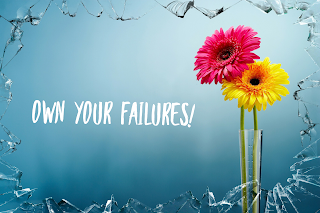It's Not My Fault and Other Excuses for Mediocrity
p.p1 {margin: 0.0px 0.0px 0.0px 0.0px; font: 16.0px Georgia; color: #323333} p.p2 {margin: 0.0px 0.0px 0.0px 0.0px; font: 16.0px Georgia; color: #323333; min-height: 19.0px} span.s1 {font-kerning: none} span.s2 {text-decoration: line-through ; font-kerning: none}

Several years ago, I was helping categorize responses to a survey. When responding to a question asking what the organization had done right, a respondent said something to the effect that the organization had made the successful people feel good.
I tilted my head and read that response with a furrowed brow (much like the warrior in The Last of the Mohicans when the girl throws herself off the cliff) and more than a bit of confusion.
This happened to be within hours of the Oscars where I’d heard almost the exact same phrase (ie. that the sole purpose of the Oscars was to make the successful people feel good and everybody else was just the scum of the earth), and even though the two instances have nothing to do with each other, the idea is the same.
Should all the movies, actors, and actresses who don’t get nominated for an Oscar blame those who do for being recognized as the best in their field?
Should all the authors (published and/or unpublished) who don’t final in a contest blame those who do for being acknowledged?
How do you reconcile that? If someone is successful at something (anything—fill in the blank), but someone else is not, why can’t we recognize that person’s success? The whole idea of not praising someone for doing a good job or going above and beyond because it might hurt someone’s feelings who didn’t achieve the same goal is ludicrous.
Let’s say I want to be a NFL football player, but since I’m not successful at it, I get all up in a huff because someone else is. For the record, never, ever in this lifetime have I wanted to be a football player, so I don’t even get upset that I’m not. In the interest of full disclosure, I may or may not be a little peeved at their astronomical paychecks, though. Ahem.
Carrying this topic into a whole ’nuther realm, if y’all don’t mind my sharing, there’s this whole “accept yourself as you are” and “it’s not my fault” mentality regarding an unhealthy lifestyle, health issues, and obesity. I’m not pointing fingers, unless at myself for wallowing in self-pity more than often than I should. And yes, I do know that there are real health issues that do limit some people’s ability to lose weight and keep it off. I know that some people have debilitating pain that limits mobility and makes something as simple as walking excruciating if not impossible. I have a friend who is unable to walk, unable even to feed herself. She’d give anything to be able do do one of those two things. Just one.
But sometimes if we give in to the naysayers and our own “pity-party” mantra, we miss out on so many blessings and things that we could do if we just believed in ourselves and pursued our dreams, our passions, our health.
Let’s drill down to this writing gig. How about, “it’s not my fault that I’m unpublished”. It’s not my fault that my stories aren’t up to par. It’s not my fault that I haven’t written a word on my wip in days, weeks, or even months. It’s not my fault that my books aren’t selling. It’s not my fault that readers don’t like my stories and are giving me two stars.
I suppose by now you’ve gotten the memo that I think the, “It’s not my fault” whine attitude has gone a little too far.
Because sometimes, it is my fault.
While I have embraced social media with gusto and enjoy connecting with “like-minded” people online, reading about their triumphs and tragedies and sometimes sharing my own, all this information can be more than is healthy for me.

I was listening to a podcast the other day that addressed this topic to a certain extent and this whole … it’s not my fault, making excuses to underperform, and feeling sorry for ourselves mentality sort of rolled into one giant rant.
We align ourselves with groups and then, like our characters who believe a lie about themselves (one of Susan Warren’s plot points), we begin to believe lies about ourselves whether it is about our health, our weight, our lack of success in our chosen field, and even our relationships. We go to extremes with this.
We feel that if we can’t have the “perfect” body, then we might as well give up and eat an entire tub of ice cream. And toss in any semblance of exercise as well. I won’t even try to get in 5K steps a day.
If we can’t be a NYT Bestseller, then why bother to write at all.
If I can’t be a NFL Football star, then I won’t play ball. (Yeah, that’s my story and I’m sticking to it.)
If I can’t be CEO of a Fortune 500 company, I’ll just go on welfare.
I know this is a hodge-podge of topics, but they somehow all go together in my mind. After listening to that podcast, I thought about a FB group that I’m in with thousands of other women with a medical condition that inhibits weight loss. (I’m being deliberately vague as it’s too complicated to go into here.) I’ve seen more than one of these women declare, “It’s not my fault” (speaking of obesity) because of said medical condition. And they just give up.
What if aligning myself with a group who wallows in self-pity and voyeuristically reading their stories of failure also makes me more apt to accept and embrace my own failures? It’s one thing to be aware of our shortcomings (you know, that whole NFL (not) football star dream of mine) vs. embracing and actively pursuing skillsets that we excel at.
One size doesn’t fit all, but I don’t think that most people who’ve found a measure of success in their professional life, their health, their finances, their addictions, go around saying… it’s not my fault.

I dare say that instead, they OWN it, whatever IT is, and then they go about fixing it to the best of their ability.

Several years ago, I was helping categorize responses to a survey. When responding to a question asking what the organization had done right, a respondent said something to the effect that the organization had made the successful people feel good.
I tilted my head and read that response with a furrowed brow (much like the warrior in The Last of the Mohicans when the girl throws herself off the cliff) and more than a bit of confusion.
This happened to be within hours of the Oscars where I’d heard almost the exact same phrase (ie. that the sole purpose of the Oscars was to make the successful people feel good and everybody else was just the scum of the earth), and even though the two instances have nothing to do with each other, the idea is the same.
Should all the movies, actors, and actresses who don’t get nominated for an Oscar blame those who do for being recognized as the best in their field?
Should all the authors (published and/or unpublished) who don’t final in a contest blame those who do for being acknowledged?
How do you reconcile that? If someone is successful at something (anything—fill in the blank), but someone else is not, why can’t we recognize that person’s success? The whole idea of not praising someone for doing a good job or going above and beyond because it might hurt someone’s feelings who didn’t achieve the same goal is ludicrous.
Let’s say I want to be a NFL football player, but since I’m not successful at it, I get all up in a huff because someone else is. For the record, never, ever in this lifetime have I wanted to be a football player, so I don’t even get upset that I’m not. In the interest of full disclosure, I may or may not be a little peeved at their astronomical paychecks, though. Ahem.
Carrying this topic into a whole ’nuther realm, if y’all don’t mind my sharing, there’s this whole “accept yourself as you are” and “it’s not my fault” mentality regarding an unhealthy lifestyle, health issues, and obesity. I’m not pointing fingers, unless at myself for wallowing in self-pity more than often than I should. And yes, I do know that there are real health issues that do limit some people’s ability to lose weight and keep it off. I know that some people have debilitating pain that limits mobility and makes something as simple as walking excruciating if not impossible. I have a friend who is unable to walk, unable even to feed herself. She’d give anything to be able do do one of those two things. Just one.
But sometimes if we give in to the naysayers and our own “pity-party” mantra, we miss out on so many blessings and things that we could do if we just believed in ourselves and pursued our dreams, our passions, our health.
Let’s drill down to this writing gig. How about, “it’s not my fault that I’m unpublished”. It’s not my fault that my stories aren’t up to par. It’s not my fault that I haven’t written a word on my wip in days, weeks, or even months. It’s not my fault that my books aren’t selling. It’s not my fault that readers don’t like my stories and are giving me two stars.
I suppose by now you’ve gotten the memo that I think the, “It’s not my fault” whine attitude has gone a little too far.
Because sometimes, it is my fault.
While I have embraced social media with gusto and enjoy connecting with “like-minded” people online, reading about their triumphs and tragedies and sometimes sharing my own, all this information can be more than is healthy for me.

I was listening to a podcast the other day that addressed this topic to a certain extent and this whole … it’s not my fault, making excuses to underperform, and feeling sorry for ourselves mentality sort of rolled into one giant rant.
We align ourselves with groups and then, like our characters who believe a lie about themselves (one of Susan Warren’s plot points), we begin to believe lies about ourselves whether it is about our health, our weight, our lack of success in our chosen field, and even our relationships. We go to extremes with this.
We feel that if we can’t have the “perfect” body, then we might as well give up and eat an entire tub of ice cream. And toss in any semblance of exercise as well. I won’t even try to get in 5K steps a day.
If we can’t be a NYT Bestseller, then why bother to write at all.
If I can’t be a NFL Football star, then I won’t play ball. (Yeah, that’s my story and I’m sticking to it.)
If I can’t be CEO of a Fortune 500 company, I’ll just go on welfare.
I know this is a hodge-podge of topics, but they somehow all go together in my mind. After listening to that podcast, I thought about a FB group that I’m in with thousands of other women with a medical condition that inhibits weight loss. (I’m being deliberately vague as it’s too complicated to go into here.) I’ve seen more than one of these women declare, “It’s not my fault” (speaking of obesity) because of said medical condition. And they just give up.
What if aligning myself with a group who wallows in self-pity and voyeuristically reading their stories of failure also makes me more apt to accept and embrace my own failures? It’s one thing to be aware of our shortcomings (you know, that whole NFL (not) football star dream of mine) vs. embracing and actively pursuing skillsets that we excel at.
One size doesn’t fit all, but I don’t think that most people who’ve found a measure of success in their professional life, their health, their finances, their addictions, go around saying… it’s not my fault.

I dare say that instead, they OWN it, whatever IT is, and then they go about fixing it to the best of their ability.
Published on November 21, 2019 21:00
No comments have been added yet.



